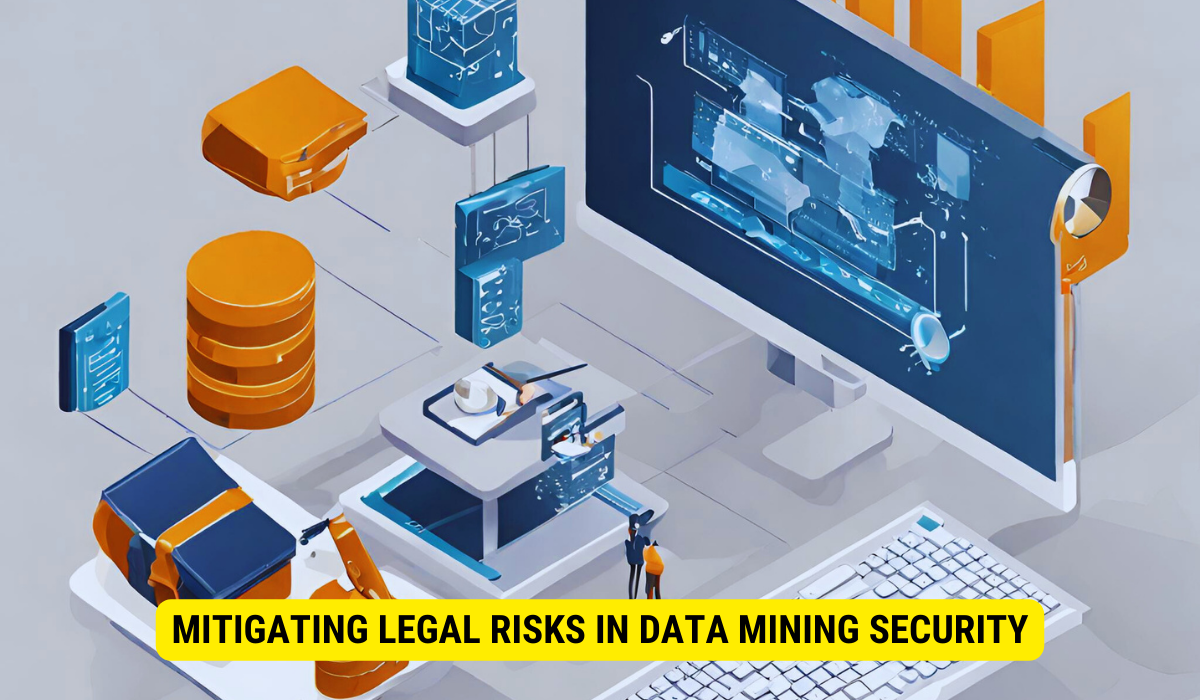Data mining, a process used to extract valuable insights from large data sets, brings forward several legal concerns related to security. These concerns encompass issues like privacy, intellectual property rights, compliance with specific legal regulations, and the potential consequences of not adhering to these legal frameworks. Organizations must proactively address these issues to ensure compliance, protect individual rights, and maintain public trust.
Data mining is a influential tool that allows firms and organizations to extract valuable insights from large data sets. However, with this power comes a great responsibility. The process of data mining raises important legal issues, particularly when it comes to security. I will explore the legal concerns surrounding data mining security and analyze their impact on data mining practices.
Understanding Data Mining and Its Importance

Data mining is the process of discovering patterns, trends, and relationships in large datasets. It involves collecting and analyzing vast data to uncover valuable insights to aid decision-making and drive business growth. The importance of data mining cannot be underestimated, as it has the potential to revolutionize industries and improve efficiency.
When it comes to data mining, organizations utilize various techniques to extract meaningful information from their data. These techniques include statistical analysis, machine learning, and artificial intelligence. By leveraging these methods, businesses can sift through huge amounts of structured and unstructured data to identify hidden patterns and gain a competitive edge.
Definition of Data Mining
Data mining encompasses various techniques, such as statistical analysis, machine learning, and artificial intelligence. These methods enable organizations to sift through massive quantities of structured and unstructured data to identify hidden patterns and gain a competitive edge.
Statistical analysis is a fundamental technique used in data mining. It involves applying mathematical models and algorithms to analyze data and uncover patterns or relationships. This technique helps businesses understand trends, make predictions, and identify potential areas for improvement.
Conversely, machine learning is centered around creating algorithms capable of acquiring knowledge from data and subsequently making predictions or taking actions without requiring explicit programming. This approach proves invaluable when handling extensive and intricate datasets, as it possesses the ability to autonomously identify patterns and provide precise forecasts.
Artificial intelligence (AI) is another crucial aspect of data mining. AI algorithms can analyze data, learn from it, and make intelligent decisions or recommendations. This technology is often used in natural language processing, image recognition, and predictive analytics.
The Role of Data Mining in Today’s World
In today’s data-driven world, data mining is crucial in numerous sectors, including finance, healthcare, marketing, and cybersecurity. It helps businesses personalize their marketing strategies, identify fraud patterns, make accurate predictions, and enhance customer experiences. However, the benefits of data mining must be carefully balanced with legal considerations, particularly security.
In the finance industry, data mining is used to analyze market trends, predict stock prices, and identify potential risks. Financial institutions can make informed decisions and optimize their investment strategies by analyzing historical data and market indicators. Data mining techniques can also help detect fraudulent activities, such as credit card scam or money laundering, by identifying unusual patterns or anomalies in transaction data.
Data mining plays a vital role in improving patient care and outcomes in the healthcare sector. By analyzing electronic health records, medical researchers can identify risk factors, predict disease progression, and develop personalized treatment plans. Data mining methods can also be used to detect outbreaks of infectious diseases, monitor the effectiveness of public health interventions, and identify patterns of medication non-compliance.
In the realm of marketing, data mining provides businesses with the means to gain deeper insights into their customer base and subsequently adapt their marketing approaches. Enterprises can craft precise advertising initiatives, provide individualized suggestions, and enhance customer loyalty through the examination of customer information, which includes their purchase history, online activity, and demographic details. Moreover, data mining aids businesses in uncovering prospective untapped markets, refining pricing tactics, and gauging the efficiency of their marketing endeavors.
In cybersecurity, data mining is used to detect and prevent cyber threats. Organizations can identify patterns indicative of malicious activities by analyzing network traffic, system logs, and user behavior, such as hacking attempts or data breaches. Data mining techniques can also be used to develop predictive models that can anticipate future cyber attacks, enabling proactive defense measures.
While data mining offers numerous benefits, it is essential to consider legal and ethical considerations. Privacy apprehensions and data security must be addressed to protect sensitive information. Organizations must comply with regulations and implement robust security measures to safeguard data and maintain public trust.
The Intersection of Data Mining and Security
Data mining and security are closely intertwined. Establishments must ensure that the data is secure and protected from unauthorized access, theft, and misuse to extract meaningful insights from data. After all, data mining involves dealing with sensitive information that may include individuals’ personal and financial details.
Regarding data mining, security is not just an afterthought but an integral part of the process. Without proper security measures, the entire data mining operation can be compromised, leading to serious consequences for the organization and the individuals whose data is being analyzed.
One of the key reasons security is so important in data mining is the need to maintain the trust of individuals. When people share their personal information with organizations, they expect it will be handled carefully and kept confidential. Any breach of this trust can have severe consequences, not only for the organization’s reputation but also for its legal standing.
The Importance of Security in Data Mining

Data mining security is paramount to maintaining the trust of individuals and protecting their privacy rights. Establishments must implement robust security measures to safeguard data from breaches, which can result in severe reputational damage and legal consequences. This is especially important considering the increasing number of data breaches and cyber attacks targeting valuable datasets.
Implementing strong security measures involves a multi-faceted approach. Organizations must invest in technologies that can detect and prevent unauthorized access to data. This can include encryption techniques, access controls, and intrusion detection systems. Regular security audits and assessments should also be conducted to identify any vulnerabilities and address them promptly.
Another important aspect of data mining security is the need for transparency. Organizations should communicate their data handling practices to individuals and obtain their consent before collecting and analyzing their data. This not only helps to build trust but also ensures compliance with data protection regulations.
Common Security Threats in Data Mining
Organizations need to address various security threats associated with data mining. These threats include unauthorized data access, data leakage, insider threats, and the potential for data distortion or manipulation. Organizations must stay vigilant and adopt stringent security measures to mitigate these risks.
Unauthorized data access is one of the most common security threats in data mining. This can occur when individuals or entities gain unauthorized access to the data mining infrastructure or the datasets themselves. Organizations should implement strong authentication mechanisms and access controls to prevent this to ensure that only authorized personnel can access the data.
Data leakage is another significant security threat. This can happen when data is inadvertently or maliciously disclosed to unauthorized parties. Organizations should implement data loss prevention measures, such as encryption, data masking, and access monitoring, to prevent data leakage.
Insider threats are also a concern in data mining. These threats arise when individuals within the organization misuse their access privileges to access or manipulate data for personal gain or malicious purposes. To mitigate insider threats, organizations should implement strict access controls, regularly monitor user activities, and provide comprehensive training on data handling policies and procedures.
Data distortion or manipulation is yet another security threat in data mining. This can occur when the integrity of the data is compromised, leading to inaccurate or misleading insights. To prevent data distortion, organizations should implement data validation and verification processes and mechanisms to detect and correct any anomalies in the data.
In conclusion, the data mining and security intersection is critical for organizations that rely on data-driven insights. By implementing robust security measures, establishments can ensure the confidentiality, integrity, and availability of data while also maintaining the trust of individuals and complying with data protection regulations.
Overview of Legal Issues in Data Mining Security
Legal issues in data mining security encompass various concerns that organizations must address to ensure compliance and protect individual rights. Let’s delve into some of the major legal concerns:
Privacy Concerns in Data Mining
One of the primary legal issues in data mining security revolves around privacy. Data mining often involves analyzing personal information, and organizations must navigate the complex web of privacy laws and regulations. They need to obtain the necessary consent from individuals and ensure that data is used only for legitimate purposes.
Intellectual Property Rights and Data Mining
Data mining can involve extracting valuable intellectual property, such as patents, trademarks, and copyrighted materials. Organizations must be mindful of intellectual property rights and ensure that they are not infringing on the rights of others. This may involve obtaining proper licenses or permissions before using proprietary data.
Legal Regulations Impacting Data Mining
Data mining is subject to various legal regulations, depending on the jurisdiction in which organizations operate. These regulations include data protection laws, consumer protection laws, anti-discrimination laws, and industry-specific rules. Establishments must comply with these regulations to avoid legal consequences and maintain ethical data mining practices.
The Impact of Legal Issues on Data Mining Practices
The legal issues surrounding data mining security significantly impact how organizations conduct their data mining practices. Compliance with legal regulations is not just a matter of avoiding legal repercussions. It also affects data mining results’ accuracy, reliability, and ethicality. Let’s explore some of the key ways in which legal issues shape data mining techniques:
How Legal Issues Shape Data Mining Techniques
Legal concerns necessitate the adoption of specific data mining techniques to ensure compliance and protect individual rights. Organizations may need to implement anonymization techniques to de-identify personal information, adopt privacy-enhancing technologies, or employ differential privacy mechanisms. These techniques help strike a balance between data utility and privacy protection.
The Consequences of Ignoring Legal Issues in Data Mining
Ignoring legal issues in data mining can have severe consequences for organizations. Apart from potential legal penalties and reputational damage, organizations may face loss of customer trust, decreased investor confidence, and limitations on accessing valuable datasets. It is in the best interest of organizations to proactively address legal issues to minimize risks.
Mitigating Legal Risks in Data Mining Security

To mitigate legal risks in data mining security, organizations must take proactive measures to ensure compliance and ethical data mining practices. Let’s explore some best practices that can help organizations navigate the legal landscape:
Best Practices for Legal Compliance in Data Mining
Organizations should conduct comprehensive data protection impact assessments to identify and mitigate potential legal risks. They should establish clear data governance policies, including data collection, processing, storage, and sharing guidelines. Additionally, organizations should implement robust data security measures, such as encryption, access controls, and regular security audits.
The Role of Legal Counsel in Data Mining Operations
Legal counsel plays a vigorous role in guiding organizations through the complex legal landscape of data mining security. They provide expertise on legal requirements, help organizations remain compliant, and ensure data mining practices align with legal and ethical standards.
Key Takeaways
- Privacy at Forefront: Privacy is a major legal concern in data mining, requiring organizations to protect and use personal information ethically.
- Intellectual Property Considerations: Data mining can involve extracting information protected by intellectual property rights, so ensuring compliance is essential.
- Regulatory Landscape: Various regulations apply to data mining, ranging from data protection laws to industry-specific regulations, necessitating organizations to remain compliant.
- Consequences of Non-Compliance: Ignoring legal aspects can have severe repercussions, including penalties, loss of trust, and restricted data access.
- Proactive Measures: Organizations should adopt best practices like data impact assessments, clear governance policies, and robust security measures to navigate the legal challenges of data mining.
FAQs
What is data mining?
Data mining involves discovering patterns, trends, and relationships in vast datasets, often using techniques like statistical analysis, machine learning, and artificial intelligence.
Why are there legal concerns in data mining security?
Legal concerns arise due to the potential for invasion of privacy, infringement on rational property rights, non-compliance with data protection regulations, and misuse of personal information.
How do privacy concerns impact data mining?
Privacy concerns necessitate adopting techniques to de-identify personal information, implement privacy-enhancing technologies, and secure consent from individuals whose data is mined.
What legal risks do organizations face if they ignore data mining regulations?
Ignoring legal issues can lead to legal penalties, reputational damage, loss of customer trust, decreased investor confidence, and limitations on accessing valuable datasets.
How can organizations mitigate legal risks related to data mining security?
Organizations can mitigate risks by conducting comprehensive data protection impact assessments, implementing robust data security measures, and leveraging legal counsel for guidance.
Conclusion
In conclusion, legal issues play a critical role in data mining security. Organizations must identify the importance of data security and privacy and proactively address legal concerns to ensure compliance, protect individual rights, and maintain public trust. By adopting best practices and leveraging legal counsel, organizations can navigate the legal landscape while harnessing the power of data mining for informed decision-making and sustainable growth.
